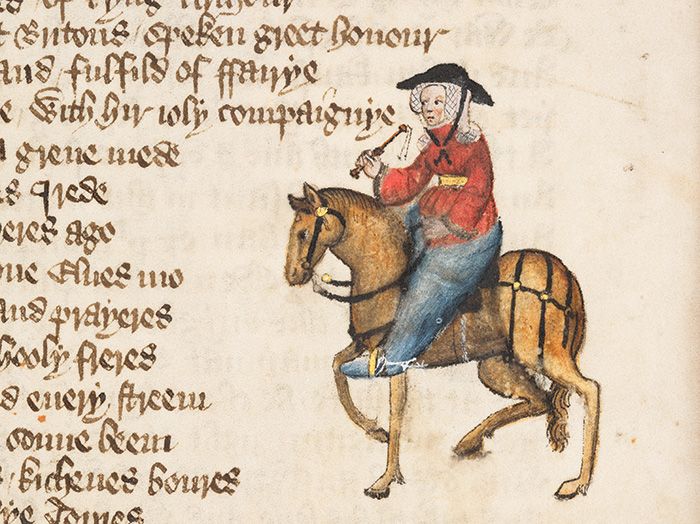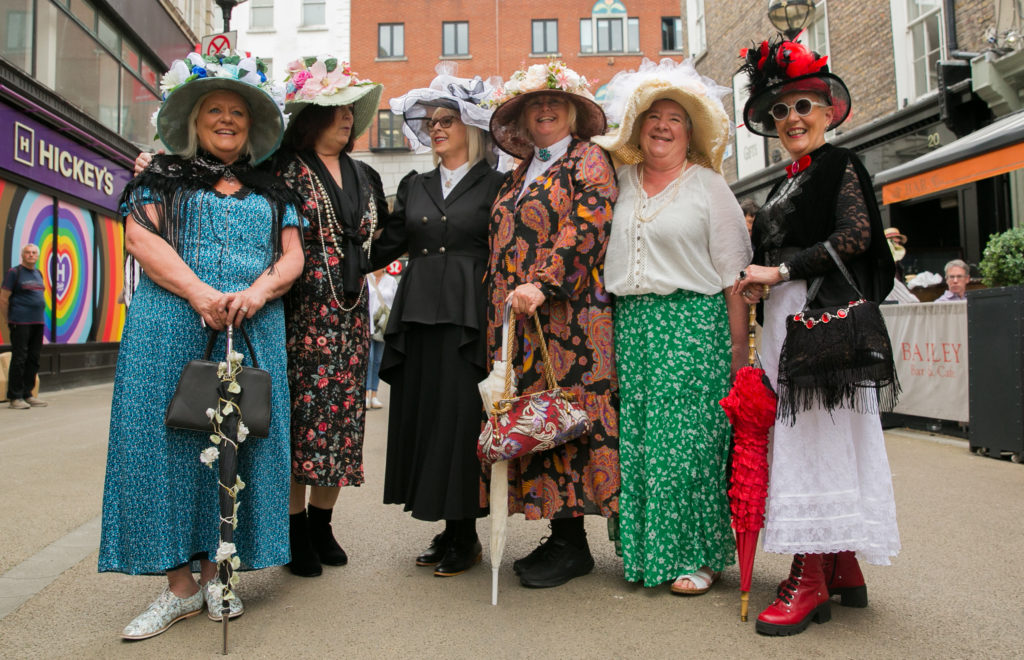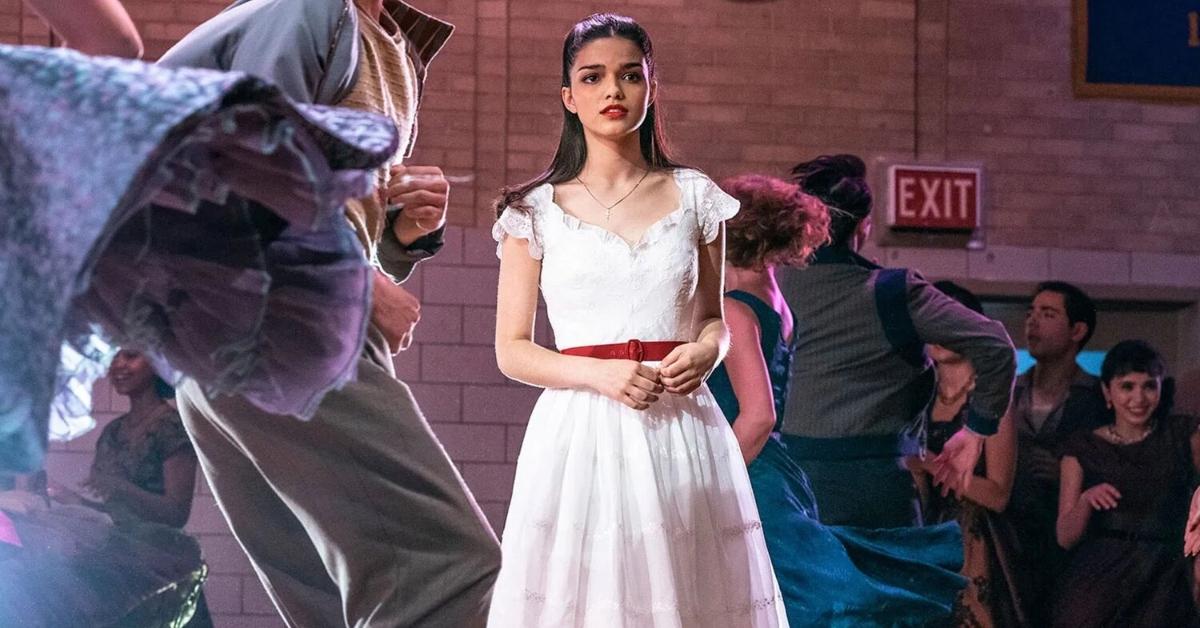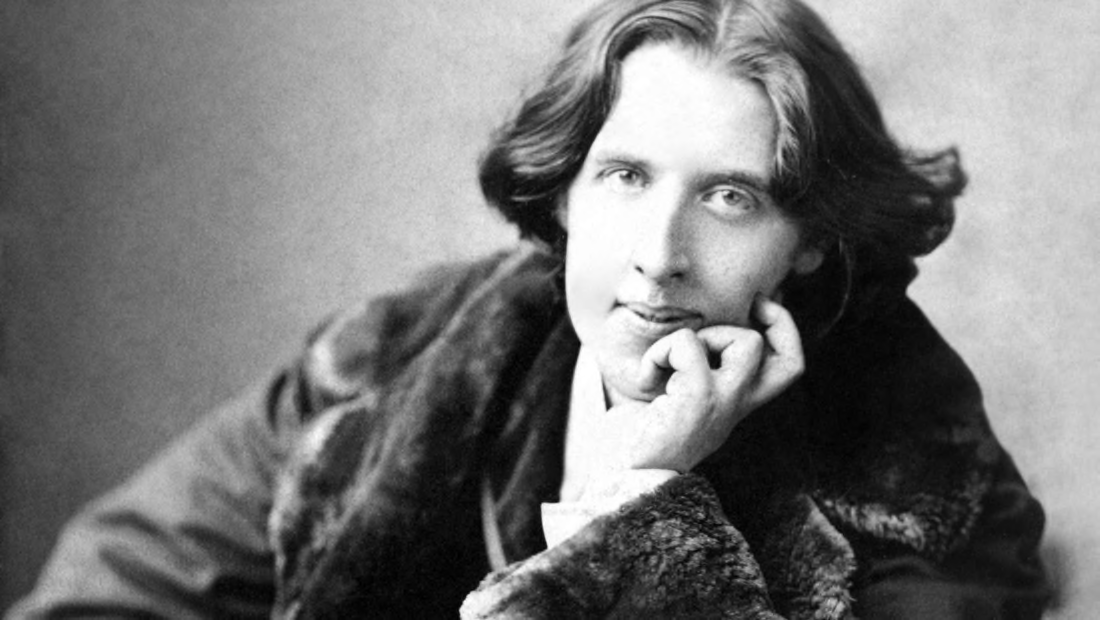
This is where it is unfortunate that [Marion Turner, author of The Wife of Bath: A Biography], otherwise a perceptive and fine-grained analyst of Chaucer’s literary magic, becomes blinkered by the feminist rhetorical lens that she has chosen for reading the Wife’s Prologue and Tale. Not just the words “misogyny” and “patriarchy,” but wince-inducing 21st-century presentisms such as “rape culture,” “gender-fluid,” “queer and trans bodies.” Turner even quotes, “Nevertheless she persisted,” the Elizabeth Warren T-shirt motto. There is a perhaps obligatory reference to Thelma and Louise (although the Wife of Bath can think circles around those two ditzes), as well as potshots at Jordan Peterson and the fogey-traditionalist MP Jacob Rees-Mogg. This is material that will not age well.
For example, Turner avers that the Wife is a “victim of domestic abuse” because her fifth husband, Jankyn, slugged her on the head during the “book of wikked wyves” fight and rendered her “somdel deef [deaf].” That sounds horrifying—except that Turner neglects to mention that it was the Wife who started the fisticuffs, as the Wife herself cheerfully admits in her Prologue.
As she tells it, she spots Jankyn reading his book while sitting by the fire, rips three pages out of it, and then hits him on the cheek so hard with her fist that he falls backwards into the fireplace. The enraged Jankyn then delivers his own blow. The Wife responds by pretending to be on the verge of death, and when an appalled Jankyn kneels by her side to blubber an apology, she slams him a second time. This is more Punch-and-Judy show than saga of a battered wife. The upshot, moreover, is that the Wife finally attains the “maistrie” that she craves over the now-humbled Jankyn: “He yaf me al the bridel in myn hond.” The artist who painted the Ellesmere miniature of her must have smiled at that….
The chief problem with an exclusively feminist reading of the Wife of Bath isn’t simply that such a reading isn’t amenable to nuanced interpretations. It’s that it never gets to the question of why Chaucer the author was so interested in anti-feminist literature that he constructed his most memorable Canterbury character as a mouthpiece for hundreds of lines of engagement with it.
For the ancient Greeks and Romans, admonitions against entanglement with both marriage and women in general constituted practically a literary genre of their own. Socrates’ biographers built Xanthippe into the nagging shrew who empties a chamber pot over her husband’s head. Ovid, in his Ars Amatoria,advised men who sought success with the fair sex never to forget their birthdays or ask them their ages. Juvenal devoted one of his Satires to warning men that their wives were likely to overspend them into penury, quarrel at the drop of a hat, go gaga over actors and musicians, and present their husbands with offspring to whom they might not be biologically related. Today’s expression “black-swan event” derives from Juvenal’s likening of the exceedingly rare worthy wife to that exceedingly rare bird. Theophrastus might not have actually written The Golden Book of Marriage (which was more likely composed several centuries after his lifetime), but the cynical portrait of wives that the book painted derived ultimately from the thought of Theophrastus’ teacher, Aristotle, who asserted that women were imperfect, emotion-ruled versions of men….
But there were other reasons for the lasting popularity of antifeminist literature besides a male-dominated society’s imposition of patriarchal values. For one thing, underneath the exaggerations of the ancients and medievals, there is a grain, and often a sand-dune, of truth. The Golden Book of Marriage may be hyperbole, but there is something uncomfortably close to home about its characterization of women’s preoccupation with clothes, home furnishings, and status competition with other women, especially over the men they deem desirable. All you have to do is dip into the most perceptive chick-lit—Jane Austen, Muriel Spark, Wendy Wasserstein—to find its female authors in essential agreement with “Theophraste” (i.e., Theophrastus). Here is Aristotle, in his History of Animals:
Hence woman is more compassionate than man, more easily moved to tears, at the same time is more jealous, more querulous, more apt to scold and to strike. She is, furthermore, more prone to despondency and less hopeful than the man, more void of shame or self-respect, more false of speech, more deceptive, and of more retentive memory.
Well, yeah.
Read the whole thing here.
Posted by Charlotte Allen

From my latest for the Epoch Times:
Gay-pride parades always had a raunchy side, but they usually took place in urban settings where people uninterested in LGBTQ life or offended by LGBTQ morality could ignore them. But as LGBTQ people became an important political constituency for the Democratic Party, and corporate America came to perceive them as an important customer base, Pride Month celebrations, pushed by aggressive LGBTQ activists, were suddenly everywhere. In schools, libraries and government buildings, in bars, restaurants, sports events, retail stores, and advertising of every variety. The LGBTQ activists became even more aggressive, determined to shove their mores into everyone else’s face. And so we’ve had such Pride Month spectacles this year as transwoman Rose Montoya stripping to the waist and baring her augmented breasts at a June 10 Pride celebration on the White House lawn. Or the Los Angeles Dodgers giving a community-service award on June 16 to the Sisters of Perpetual Indulgence, a group of drag queens who mock and parody Catholic nuns.
Second, Pride Month promoters have begun targeting children. Pride Month used to be an adults-only phenomenon, although some progressive parents did sometimes bring their children to the parades. But over the past decade transgender people—the “T” in “LGBTQ”—and their epigones, drag queens, have taken over the leadership and become the public face of the Pride movement, pushing aside the gay men and lesbians who were historically its spokesmen. It’s an imperative of transgender ideology that children should learn about and express their “gender identity” when as young as possible, and that they receive “gender-affirming care”—that is, radical hormonal and surgical interventions—as early as possible, preferably before they’ve matured into their hated adult biological bodies. And so we have Drag Queen Story Hour, “multiple gender expressions” kids’ clothing, and classrooms sessions for five-year-olds where they learn to explore alternate gender and sexual identities, often without the knowledge, much less consent, of their parents. This year, when the Washington Post ran a Page 1 story on June 11 about a Pride Month parade in downtown Washington, the photo it chose for illustrating the story wasn’t of any of the LGBTQ marchers. It was of a 7-year-old girl, twerking.
So not surprisingly there’s been a backlash. People are starting to resent what they believe is the compulsory celebration of a tiny minority of fellow humans with whom they don’t necessarily identify. And what they rightly perceive as the inappropriate sexualization of children. Perhaps Pride Month promoters should reflect on the original “pride month” in 1969. It lasted only six days. It wasn’t a top-down government or Big Business operation, and the people who cheered it on were there because they wanted to be there.
Read the whole thing here.
Posted by Charlotte Allen

Photo: Gareth Chaney, Waterford News
There is one thing, however, that few of the cosplayers and kidney-eaters will have done: actually read Ulysses itself. Sure, some of them will have made it through the first few chapters of Joyce’s 700-page doorstopper (“Stately, plump Buck Mulligan” at his shaving bowl, Dedalus walking along the Sandycove beach), although such sentence-clusters as this:
His lips lipped and mouthed fleshless lips of air: mouth to her moomb. Oomb, allwombing tomb. His mouth moulded issuing breath, unspeeched: ooeeehah: roar of cataractic planets, globed, blazing, roaring wayawayawayawayaway.
might have sent them back to the tap for another pint. They might also have dipped into adulterous-wife Molly Bloom’s famous “stream-of-consciousness” soliloquy that forms Ulysses’s last chapter. Although probably not the whole 40-page thing, which can be rough going in its stream-of-consciousness format, but certainly the orgasmic finale, memorialized for posterity in The Family of Man, the 1955 photography book that graced the coffee table of every college professor in Silent Generation America: “I asked him with my eyes to ask again yes and then he asked me would I yes to say yes my mountain flower and first I put my arms around him yes and drew him down to me so he could feel my breasts all perfume yes and his heart was going like mad and yes I said yes I will Yes.” But that’s usually about it.
The candor with which self-proclaimed Joyce enthusiasts admit they have never gotten far into Ulysses is amazing. National Geographic contributor Edmund Vallance, writing a piece timed with the 2022 centennial of the novel’s publication, called Ulysses a “modernist masterpiece” but admitted that “in my dim-witted forties, I was still struggling with ‘the ineluctable modality of the audible,’ and was less than confident about [such Joyce coinings as] ‘contransmagnificandjewbangtantiality.’” And he was someone who actually made it through the book after several false starts. The Guardian’s Sian Cain, celebrating the 75th anniversary of Joyce’s death in 2016, confessed: “I’ve opened Ulysses twice, determined to finish it, and achieved getting all the way to page 46.” He had been preceded by none other than D.H. Lawrence: “I am sorry, but I am one of the people who can’t read Ulysses.” And also Virginia Woolf: “I have read 200 pages [of Ulysses] so far—not a third; and have been amused, stimulated, charmed, interested, by the first 2 or 3 chapters—to the end of the cemetery scene; and then puzzled, bored, irritated and disillusioned by a queasy undergraduate scratching his pimples.”
I am one of the few living people (besides Vallance) who managed to get through Ulysses to the bitter end. I had to—it was on the required summer reading list between junior and senior years for my college English honors program, and I had to take a test on it and other major English-language works in the fall. That summer I was also on a college trip to classical sites in Greece and Italy, so I crammed my Ulysses reading into breaks at Delphi, Pompeii, and elsewhere. I admit it: I was mostly just turning pages. I hardly could follow a word (see the above-quoted verbiage for why). And since I was relatively innocent in carnal matters (I had put on the freshman 15—or 30, let’s be honest—and could scarcely get a date), nearly all the sex went over my head. When reading the “Nausicaa” passage in Ulysses, I thought it was all about the romantic fantasy of a teen-age girl, Gerty MacDowell, that an older man—Leopold Bloom—might be admiring her from a distance, inspiring her to show off her knickers, so I failed to catch Joyce’s revelation that Bloom, well into his 40s, was masturbating behind a rock throughout the incident….
Read the whole thing here.

Image: U.K. Daily Mail
That fun-loving AOC is at it again!
We know that nothing interferes with the Dem congresswoman’s idea of a good time than those dumb old New York City covid restrictions: the masks, the vax mandates, the rest of the joy-killers that have New Yorkers huddling terrified inside their apartments.
So she bolted her icy and fear-ridden home city as soon as she could for a New Year’s weekend vacation in freedom-loving Florida, where sunshine, palmettos, and bans on mandates abound.
But–oops!–while the real Alexandria Ocasio-Cortez loves nothing so much as a good time, the public-persona Alexandria Ocasio-Cortez is something of a…coronavirus stiff. Here she is pulling a long face on Twitter when Texas dropped its mask mandate in March 2021:
Repealing the mask mandate now endangers so many people, especially essential workers & the vulnerable.
So when AOC showed up in a photo of her maskless self lunching in Miami with boyfriend (and Prince Harry clone) Riley Roberts, much laughter ensued. Especially when former Trump advisor Steve Cortes noted that the center of the photo consisted of shorts-clad Roberts’s sockless man-toes as he sat across the table from AOC. Cortes tweeted:
Her guy is showing his gross pale male feet in public (not at a pool/beach) with hideous sandals.
Well! Our AOC didn’t like that! So she responded:
If Republicans are mad they can’t date me they can just say that instead of projecting their sexual frustrations onto my boyfriend’s feet,” she tweeted, adding “Ya creepy weirdos.” She added, “It’s starting to get old ignoring the very obvious, strange, and deranged sexual frustrations that underpin the Republican fixation on me, women, & LGBT+ people in general. These people clearly need therapy, won’t do it, and use politics as their outlet instead. It’s really weird.”
Then she took action: Hey Republicans, if you don’t like sockless bare feet on one of my guys, how about an underpants-less bare crotch? So the very next day or so of her Florida vacation AOC headed out to what’s been described as a Miami drag bar to have herself photographed in the arms of purse-clutching actor Billy Porter wearing, um, nothing underneath his orange-printed flyaway caftan. Scroll down to the photo of the two embracing for a selfie in this U.K. Daily Mail story. Fortunately a shadow–or maybe the efforts of a Daily Mail photo editor–blots out the fine details of what Porter is putting on full display while AOC…looks up at the sky and seemingly pretends to be focused on something else.
At this point you might be asking yourself: Who’s the “creepy weirdo” now?
But you’ve got to admit this: A bare man-crotch trumps bare man-toes any old day.
Posted by Charlotte Allen
Good people all, this Christmas time
Consider well and bear in mind
What our good God for us has done
In sending His beloved Son
With Mary holy we should pray
To God with love this Christmas Day
In Bethlehem upon that morn
There was a blessed Messiah born
Posted by Charlotte Allen

A species of gelatinous creatures, having abandoned their dying planet and traveled to Earth, land in San Francisco. They infiltrate Earth’s ecosystem, latching onto plant life and taking the form of small pods with fragrant pink flowers. Elizabeth Driscoll, a laboratory scientist at the San Francisco Health Department, brings one of the flowers home, where she lives with her boyfriend, Geoffrey. Leaving the flower on their bedside table, she awakens the next morning to discover Geoffrey behaving strangely cold and distant.
Elizabeth’s colleague, Matthew Bennell, suggests she speak to his psychiatrist friend, David Kibner, who is holding a book-signing party to promote his new self-help book. As Elizabeth and Matthew drive to the bookstore, a hysterical man on the road screams to them, shouting “They’re coming! You’ll be next!” before being chased away by a mob of people and then hit by a car.
Posted by Charlotte Allen

From my latest for the Wall Street Journal:
I can’t even figure out how “Latinx” is supposed to be pronounced. Does it rhyme with “sphinx” (how it looks on the printed page) or “Kleenex”? Sen. Elizabeth Warren says “Latin-ex,” as if referring to a Cuban man she once dumped. A word with a consonant followed by an x makes no sense in Spanish.
Actual Latinos shun the word “Latinx.” According to a November 2021 poll by Bendixen & Amandi International, only 2% of Americans of Latin descent refer to themselves that way. Some 68% prefer “Hispanic” to “Latino” and “Latina.” And 40% are offended by “Latinx,” which means it’s a mistake for a politician to use the word, at least around Latino constituents.
But woke journalists love “Latinx.” It’s everywhere, even in Cook’s Country magazine, which recently promised to feature more “Latinx” recipes. As you’ve undoubtedly guessed, the word originated in academia. During the mid-2000s, professors were casting about for a gender-neutral substitute for the clunky “Latina/o” and preposterous “Latin@” that they were already using. Someone suggested “Latinx,” and it caught on in journals with names like Feministas Unidas and Cultural Dynamics. Soon enough, articles were appearing in the mainstream press with titles like this one from the Washington Post: “A Latinx New Yorker feels at home in a Latinx Community Searching for its identity in London.”…
Read the whole thing here.
Posted by Charlotte Allen

From my latest for the Washington Examiner:
Astonishingly for a man whose early writings often extolled the beauty of boys and who had formed intense male friendships that were more like romantic attachments, Wilde had no homosexual experience until 1886, when he was in his thirties and met then-17-year-old Robert “Robbie” Ross. That first encounter brought Wilde the “joy, the delirium” (Wilde’s own words) of sexual liberation. But as [new biographer Matthew] Sturgis writes: “Henceforth his actions would demand secrecy and the elaborations of a double life.” There were more young men, quite a few more. In 1891, Wilde met Bosie, then an undergraduate at Oxford and an aspiring poet of distinctly less talent than Wilde (he coined the phrase “the love that dare not speak its name”), and became infatuated. Bosie was a piece of work, vain, petulant, and whiny, even as Wilde, generous to a fault, showered him with expensive gifts and treats. It is difficult to decide who in the Queensberry affair was the worse: the brutish, vindictive marquess determined to destroy Wilde, or his self-centered, tantrum-prone son.
Bosie’s promiscuity was “voracious,” as Sturgis writes, and he introduced Wilde to a netherworld of boy prostitution: professional rent-boys and working-class teenagers willing to service older men for a good dinner or a suit of new clothes. Wilde liked to hand out silver cigarette cases, and he handed out a good many. Few of these erotic finds were over age 18, and at least one youth was only 14. Sturgis does not varnish over these episodes, and he paints quite a sordid picture. Those who think that Wilde’s two-year prison sentence for such activities was outrageous might consider what sort of sentence he might receive under current laws regarding paid sex with minors.
After his libel action against Queensberry failed, Wilde’s arrest was imminent, and friends urged him to leave the country. Wilde refused, a decision that some have attributed to a stance of heroic defiance but that Sturgis contends was mostly due to inertia. Two criminal trials followed, in which Wilde’s efforts to sidestep prosecutors’ questions with his customary witticisms made him look even worse. Victorian prisons were no joke, especially for a 40-year-old man used to luxurious living, and amid many other indignities, he fell and ruptured his right eardrum; the resultant chronic infection led ultimately to his death. He had always been but one step ahead of his creditors even when he was raking in money from his plays, and his conviction was followed by bankruptcy and the loss of his London house and all his possessions, including his manuscripts. Still, he was right back with Bosie within months after his release.
Read the whole thing here.
Posted by Charlotte Allen

December 22nd will be the 50th anniversary of the release of Sam Peckinpah’s Straw Dogs, a film so marked by violent killings and violent sex that, according to Peckinpah’s biographer, David Weddle, a third of the audience walked out of its premiere before the end. But most of those who remained, Weddle reports, hooted and cheered as protagonist David Sumner, a hitherto-passive American academic played by Dustin Hoffman, ruthlessly repelled a passel of homicidal home-invaders besieging the English farmhouse where he lived with his wife. Set in the fictional village of Wakely amid the stark West Country moorlands of Cornwall, Straw Dogs was one of a clutch of films released during this period that examined the lethal conflict between savage rubes and clueless city sophistos—a counterpart to Ted Kotcheff’s grim Australian psychodrama, Wake in Fright (also 1971), and John Boorman’s Southern backwater classic, Deliverance (1972).
Controversial from the day of its release, Peckinpah’s film has remained so for five decades, both for its presumed glorification of violence and for its unsympathetic treatment of Sumner’s young and beautiful Wakely-born wife, Amy (Susan George, then only 20). The day before the siege, Amy is raped by two members of the mob—her former boyfriend, Charlie Venner (Del Henney) and his malevolent companion, Norman Scutt (Ken Hutchison). Clad only in underclothes and a hip-length bathrobe, she admits Venner to the Sumners’ home in her husband’s absence with the offer of a drink. At first, she resists Venner’s violent assault (he slugs her, drags her across the stone floor by her hair, and shreds her clothing), but then hungrily reciprocates, desperate for the passion denied by her sterile marriage and feckless husband.
The second sexual assault occurs immediately after the first, when Scutt appears and forces Venner at gunpoint—at least, at first—to restrain Amy while he sodomizes her, a horrifying experience for Amy and audience alike. The first of these attacks produced more outrage than the second—the suggestion that a woman could enjoy being forcibly dominated by a man was (and still is) categorically verboten in the canons of contemporary feminism, and the scene immediately became a flashpoint of liberal film criticism….
Among the harshest of the film’s early critics was the New Yorker’s Pauline Kael. In an essay published on January 29th, 1972, Kael excoriated Peckinpah for patenting what she described as an “aesthetic of cruelty.”
Read the whole thing here.
Posted by Charlotte Allen

From my latest for the Epoch Times:
The American Booksellers Association is a trade organization for America’s dwindling number of independent, non-chain bookstores. Those community-based stores “serve a unique role in promoting the open exchange of ideas” the ABA’s website declares.
Unless, it would seem, the “ideas” are deemed objectionable by the progressive powers that be. Then, the ABA switches from promoter of “open exchange” to iron-fisted censor worthy of the 17th-century Puritans who banned all books that criticized their Massachusetts theocracy. Nor is the American Booksellers Association alone as an organization ostensibly devoted to the values of free speech and a free press exemplified in the Constitution’s First Amendment, but in actuality an enforcer of canceling whatever products of speech and press are ruled out of bounds by a left-leaning cultural establishment….
Case in point: the ABA’s treatment of Abigail Shrier’s best-selling “Irreversible Damage: The Transgender Craze Seducing Our Daughters.” Shrier, a veteran journalist, cites research studies to argue that the current surge of teen-age girls deciding they are born into the wrong body and are actually boys is simply a reaction to adolescent anxieties, encouraged by social media, that doctors are grossly mistreating with radical body-altering surgeries and prescriptions of massive amounts of male hormones that can destroy the girls’ prospects for future fertility. The Economist magazine picked “Irreversible Damage” as one of its Books of the Year for 2020—and so the ABA included the book, now in paperback, along with promotional materials paid for by its conservative publisher, Regnery, in a July 2021 mailing to 750 independent bookstores.
Within days Casey Morrissey, a self-described “trans bookseller and book buyer” at Brooklyn’s Greenlights Bookstore, was complaining on Twitter that the book was “anti-trans”—because it failed to adhere to the transgender-activist dogma that a person’s self-described gender is a biological reality—and if that person’s body doesn’t conform, correction by whatever medical means necessary is appropriate, even if that person is a child. “Do better,” Morrissey tweeted on July 14, and was promptly joined by other booksellers tweeting similar sentiments. Transgender activists have already—although so far unsuccessfully—tried to pressure online retailers such as Amazon not to carry Shrier’s book.
The ABA’s apology on Twitter came within hours. “This is a serious, violent incident that goes against ABA’s ends policies, values, and everything we believe and support. It is inexcusable.” That wasn’t good enough for the activist booksellers, however (“[W]e’re extremely disappointed and angered to see the ABA promoting dangerous, widely discredited anti-trans propaganda,” the Harvard Book Store tweeted). So on Aug. 9, after consulting with the ABA’s “Diversity, Equity, and Inclusion” committee (yes, the ABA has one of those), the organization’s CEO, Allison Hill, issued a 1,400-word breast-beating statement that read like the product of a Maoist struggle session: “These were egregious acts.” In the future, Hill promised, all the organization’s promotional material would be screened to exclude books exhibiting “hate speech” under the U.N.’s definition: “pejorative or discriminatory language with reference to a person or a group on the basis of who they are.”
Finally, there’s the American Library Association, the librarians’ trade organization whose watchword is “freedom to read.” The ALA’s “Banned Books Week” (this year from Sept. 26 to Oct. 2) focuses on controversial books that activist groups, typically on political and religious right, have tried to get removed from the shelves of public libraries.
But the ALA now has a book-banning problem of its own involving controversial books: six “Dr. Seuss” books for children written mostly during the 1950s by the beloved author and illustrator Theodor Geisl. Some of those books—“If I Ran the Zoo” and “And to Think That I Saw It on Mulberry Street” have been childhood icons for generations of Americans, but Dr. Seuss Enterprises, which holds the copyrights to Geisl’s works, has decided that some of the illustrations are racially insensitive: “[T]hey portray people in ways that are hurtful and wrong.” The company has withdrawn all six books from future publication. The ALA refuses to describe the company’s actions as censorship.
Read the whole thing here.
Posted by Charlotte Allen
